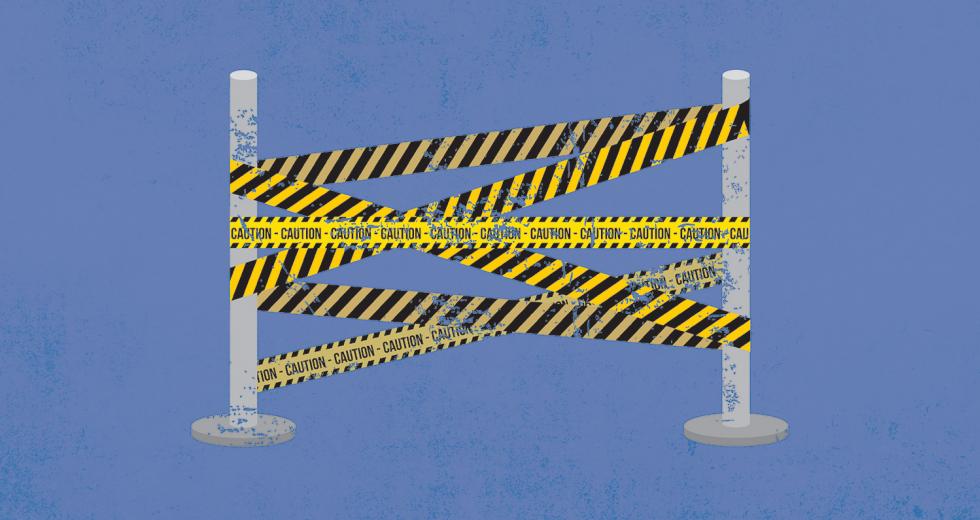What percentage of your time each day is spent playing whack-a-mole with other people’s needs? How do you decide if giving into them is time well-spent or just a vacuum of frustration you’ll wish you’d never given into? How often do you do something for others when you don’t really want to but feel awkward saying “No”?
These scenarios come down to one word: boundaries. Boundaries are the metaphorical lines we draw to ensure we don’t slip into doing things that counter our value systems. Having clear boundaries prevents other people from taking advantage of you and helps you keep your distance from possible dubious activities. While there are no hard-and-fast rules for setting your boundaries, these tips may be helpful.
Know your value system and then craft your boundaries accordingly. A trick I use with my clients is to have them write each value on an individual index card. Once written out, I ask them to look the cards over thoughtfully and decide what their values mean for them. Then I ask them to literally give up a value by handing over one of their cards, then another and so on until they have only a few cards left — their core values. Understanding our non-negotiable core values is foundational to putting a boundary or two in place.
Examining the flip side of feeling angry, frustrated or resentful is another great way to mine for values and, coincidentally, highlight boundary issues. Notice what happens when you experience anger, frustration or resentment. In these situations, you can learn a lot about your internal value system by asking yourself, “What values of mine are being stepped on here?” Knowing the core value that someone is infringing upon will help you build a boundary that insulates you from similar future situations.
Don’t rationalize away your value system for the sake of being liked. Few people like to be judged or disliked. To avoid these unpleasant feelings, we might, unfortunately, “move the line” on what really matters to us — like agreeing to do something that goes against our values in order to maintain relationships.
Assertively set your boundaries either by action or with words. Being assertive means you ask that your needs be met without violating the rights of others, generally yielding a positive result. Using “I” statements as to why a certain action doesn’t work for you is far more likely to yield a good result than when you use “you” statements.
Related: 3 Steps for Setting Boundaries
Additionally, you can assertively put a boundary in place and never talk about it at all, instead simply acting on it can suffice. For instance, if you feel the need to immediately respond to people’s non-urgent emails or pings in your office you are teaching them to expect an immediate response, and round and round it goes until you are angry and resentful. Fixing this doesn’t require a big conversation, just a conscious effort on your part to set a block of time aside to respond. Not only do boundaries get you what you want, but they teach people what to expect, too.
One person’s boundaries can become another person’s problem so it’s important to look at the perspectives of others before you articulate your boundaries. If you just can’t take on any more work, putting a boundary up is a good idea. But that work has to go somewhere, so think about the causal relationships between your boundaries and how they are received.
Communication patterns are important in being fair to others and yourself. Like a boat cutting through water, we all leave a communication “wake,” meaning our unique communication patterns. Pay attention to your own and other people’s communication patterns — the past is the best predictor of the future — so you can rehearse how to deal with those who routinely frustrate you.
Start small and, later, go big because working on creating boundaries is like any new habit — it takes practice. So start with the small stuff and go bigger as you gain confidence. Confidence comes when you start to see the boundaries work, getting you closer to your desired outcomes.
Boundaries are a big issue in our lives. They come up every day in one way or another. Being mindful of how you respond in various situations helps get you clarity on the work you need to do around setting them. Start with a small one today.
Recommended For You

Dilemma of the Month: Professional Work on Your Personal Cell
Where to set boundaries and how to maintain them
I work at a marketing company and often work long hours. Sometimes issues come up outside of the office, and I frequently find myself using my cellphone (and personal computer) for work. Am I required to do this and if not, how can I respectfully set limitations?

Do Ask; Don’t Tell
Cultivate employee strengths by asking more questions
If I have learned one thing by working with people in organizations, it’s that there’s much more telling than asking going on. As a business coach, my clients will expect me to ask, at some point in their session, “So what’s the question?”



